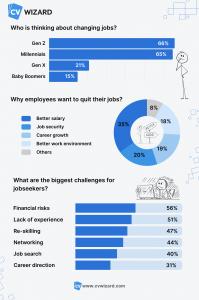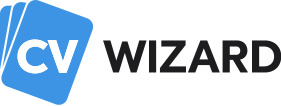Two-Thirds of Gen Z Plan to Quit in 2025, CVwizard Report Finds

Gen Z and Millennials lead the great resignation wave: 66% of Gen Z and 65% of Millennials say they plan to quit in 2025. Salary, job security, and toxic workplaces are the top reasons — but financial risk remains the biggest barrier to making a move.

CVwizard
A new report shows that low pay, job insecurity, and toxic work environments are pushing young professionals to quit in large numbers.
CVwizard’s survey of U.S. employees reveals that 61% of all workers are planning or hoping to switch jobs within the next year. Only 21% expect to stay in their current roles, while 18% remain undecided.
The financial risks are steep. Past research from Gallup estimates that replacing an employee can cost anywhere between 50% and 200% of their annual salary. According to the 2025 Retention Report by Work Institute, these costs are only expected to grow with rising wages, turnover, and hiring competition.
Gen Z Women Lead the Quitting Charge
Overall, 61% of American workers say they are planning or hoping to change jobs in 2025. Gen Z workers are especially restless, and gender plays a role. Among Gen Z, 71% of women and 63% of men say they’re planning to leave. Meanwhile, Millennial and Gen X men (70% and 51%) report a stronger intent to quit than their female peers (62% and 40%).
Notably, even older generations are reconsidering their careers: 40% of Gen X and 15% of Baby Boomers say they’re open to making a move, a sign that the desire for change crosses generational lines.
Turnover Driven by Toxic Workplaces and Stalled Careers
Why are so many workers ready to walk away? According to the report, four key factors are driving the shift:
Higher pay (35%): With inflation, student loans, and rising living costs, salary is still the biggest driver of job changes.
More job security (20%): After years of layoffs and instability, workers are craving stability and peace of mind. In fact, according to the 2025 State of Company Culture Report, over one-third of employees regularly worry about their job security, and among those who feel insecure, more than two-thirds are actively looking for a new job.
Career development (19%): Many employees say they’re stuck with no clear path forward and are looking for growth opportunities.
Better work environments (18%): Toxic or unsupportive workplaces are pushing people to find employers who genuinely care about well-being and inclusion.
Taken together, these reasons show that it’s not just about ambition, it’s about survival, mental health, and the desire for a better quality of life.
“If companies want to hold onto talent, especially younger workers, they need to do more than just offer a paycheck,” says Reyhaneh Mansouri, PhD, a Career Expert at CVwizard. “That means regular salary reviews, honest conversations about job security, and creating a workplace where people feel respected and heard. People want to grow, and they want to know that someone’s invested in their growth.”
Ready to Quit, But Unable to Afford It
Even though many are ready to move on, taking that leap isn’t always easy. Financial pressure is the biggest roadblock: 56% of workers say they’re afraid they can’t afford to quit. Others worry they don’t have the right skills (51%) or connections (44%) to make a successful transition. For some, it’s simply not knowing what to do next (31%).
Each generation faces different challenges. Gen Z often struggles with confidence and networking, while Millennials and Gen X cite financial strain and the need to upskill. Older workers are more concerned with how to navigate late-career transitions.
In many cases, people aren’t leaving because they’re unmotivated; they’re leaving because they feel stuck.
A Chance to Rethink Work and Retention
The Future of Job Applications for Gen Z highlighted how this generation is reshaping expectations for transparency, flexibility, and digital-first processes. These expectations don't stop at onboarding; they carry through every workday.
This isn’t a crisis of loyalty. It’s a wake-up call. Gen Z and Millennials are raising the bar for what they expect from work, and employers who meet those expectations can turn this moment into an opportunity.
About
Founded in 2000 by employment experts, CVwizard has grown to support job seekers in 190 countries and 26 languages. As a global leader in resume creation, CVwizard has developed a deep understanding of the dynamic job market. With decades of experience, CVwizard empowers candidates worldwide to take the right steps in their careers.
David Overmars
CVwizard
email us here
Visit us on social media:
LinkedIn
Legal Disclaimer:
EIN Presswire provides this news content "as is" without warranty of any kind. We do not accept any responsibility or liability for the accuracy, content, images, videos, licenses, completeness, legality, or reliability of the information contained in this article. If you have any complaints or copyright issues related to this article, kindly contact the author above.
Hayden Foundation of Rhode Island Sees Record Grant Applications, Reflecting Growing Education and Animal Welfare Needs
Second Heart Assist's Whisper Device Poised to Advance AHA CKM Goals with Breakthrough Heart–Kidney Support
Be a Better Leader: A Situational Guide with Practical Tools to Empower Leaders at All Levels for Effective Leadership
Więcej ważnych informacji
 Jedynka Newserii
Jedynka Newserii

 Jedynka Newserii
Jedynka Newserii

Konsument

Polacy nie korzystają z hossy trwającej na warszawskiej giełdzie. Na wzrostach zarabiają głównie inwestorzy zagraniczni
Od października 2022 roku na rynkach akcji trwa hossa, nie omija ona także warszawskiej giełdy. Mimo to inwestorzy indywidualni odpowiadają zaledwie za kilkanaście procent inwestycji, a o wzrostach decyduje i na nich zarabia głównie kapitał z zagranicy. Widać to również po napływach i odpływach do i z funduszy inwestycyjnych. Zdaniem Tomasza Koraba, prezesa EQUES Investment TFI, do przekonania Polaków do inwestowania na rodzimej giełdzie potrzeba zysków z akcji, informacji o tych zyskach docierającej do konsumentów oraz czasu.
Polityka
Obowiązek zapełniania magazynów gazu w UE przed sezonem zimowym ma zapewnić bezpieczeństwo dostaw. Wpłynie też na stabilizację cen

Unia Europejska przedłuży przepisy z 2022 roku dotyczące magazynowania gazu. Będą one obowiązywać do końca 2027 roku. Zobowiązują one państwa członkowskie do osiągnięcia określonego poziomu zapełnienia magazynów gazu przed sezonem zimowym. Magazyny gazu pokrywają 30 proc. zapotrzebowania Unii Europejskiej na niego w miesiącach zimowych. Nowe unijne przepisy mają zapewnić stabilne i przystępne cenowo dostawy.
Infrastruktura
Gminy zwlekają z uchwaleniem planów ogólnych zagospodarowania przestrzennego. Może to spowodować przesunięcie terminu ich wejścia w życie

Reforma systemu planowania i zagospodarowania przestrzennego rozpoczęła się we wrześniu 2023 roku wraz z wejściem w życie większości przepisów nowelizacji ustawy z 27 marca 2003 roku. Uwzględniono w niej plany ogólne gminy (POG) – nowe dokumenty planistyczne, za których przygotowanie mają odpowiadać samorządy. Rada Ministrów w kwietniu br. uchwaliła jednak ustawę o zmianie ustawy z 7 lipca 2023 roku, a jej celem jest zmiana terminu obowiązywania studiów uwarunkowań i kierunków zagospodarowania przestrzennego gmin na 30 czerwca 2026 roku. Wskazana data może nie być ostateczna z uwagi na to, że żadna z gmin nie uchwaliła jeszcze POG.
Partner serwisu
Szkolenia

Akademia Newserii
Akademia Newserii to projekt, w ramach którego najlepsi polscy dziennikarze biznesowi, giełdowi oraz lifestylowi, a także szkoleniowcy z wieloletnim doświadczeniem dzielą się swoją wiedzą nt. pracy z mediami.








.gif)

 |
| |
| |
|